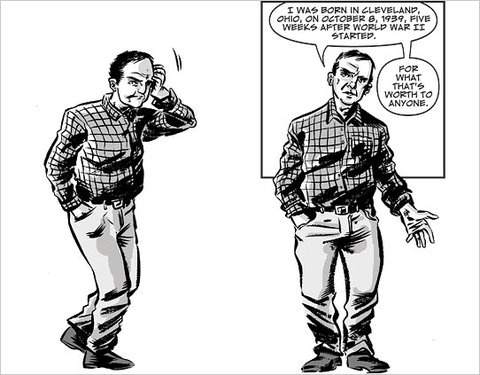
Sad thing to wake up to the news of the passing of Harvey Pekar. We took him for granted, because he just seemed like he'd always existed and always would. As a creator, he liberated the rest of us. He is oft-quoted as insisting that words and pictures could tell any story, and his comics were the best proof of that. He turned comics around and said they don't have to be big and bright and about guys knocking each other on the head to be compelling. They could also be about the most minute human details, which in his hands became larger than any world-ending super-villain plot. Because that's real life.
When I got my first comics gig at Dark Horse in the 1990s, I was assisting Diana Schutz and she was editing the American Splendor books at the time. Part of my job was handling a lot of her phone calls, and so I got to talk to Harvey Pekar pretty regularly. Despite his curmudgeonly reputation, I always looked forward to those calls. I never knew what topic Harvey would be on that day, and he'd talk about many things, including his love for jazz and his frustration with what most people liked to read in their comics. I recall one conversation where he explained an entire story to me, panel by panel, that he was planning, all about how Jack Kirby was a talented children's book author and nothing more and that his fans were all children, as well. (Harvey shared similar views about the academic veneration of detective fiction, so he had definite opinions about literature for adults.) I was laughing throughout, but I was also slightly horrified. When he was done, he asked me if I thought he should put that in the next American Splendor. I bit the bullet and told him, no, probably not. Mike Richardson was friends with Jack Kirby's widow, she had been in the office recently to discuss publishing a portfolio of Jack's religious artwork, and so I had serious doubts that the company would want to endorse such a thing. "Oh, well, never mind then," Harvey said. That was how it was with Harvey. Tell it to him square, and he'd respond in kind.
I only met Harvey in person once. He and his wife Joyce Brabner came out to Oregon for some event or other. A group of us went out for dinner, but Harvey wasn't very interested in the food or his fellow diners. He was preoccupied with buying lighter fluid. He had gone record shopping that day, including a stop at Crossroads on Hawthorne Boulevard, a co-op store where individual sellers rented space and sold all kinds of music. They had a bluesman on their hanging store sign--Robert Johnson, maybe?--that looked like it could have been drawn by R. Crumb, so it was really Harvey's kind of place. He'd bought a bunch of jazz records there, but the seller had ensured that no one could swap different records into different sleeves in order to get a cheaper price by putting a second price tag on the vinyl itself. He'd put the stickers in the blank space between the last groove and the label. They had told Harvey that lighter fluid would take off any leftover goo once the tag was peeled, but he didn't believe them and he wanted to make sure he tried it before he got back to Cleveland and couldn't return the discs. His worrying made him withdrawn, and he didn't talk much. It was a genuine Harvey Pekar moment.
Years later, when the American Splendor movie came out, I was working at Oni Press, so I wasn't in on any of the activity that swirled around the film. It was weird to watch it, though, and see this blend of fiction and documentary, to see this guy I knew on screen both in the flesh and portrayed by an actor. There is even a scene where Harvey has a bunch of comics hanging on the wall behind him, and there are a few I am credited in. Viewing the movie became a completely surreal experience, like there was an added layer to the metafiction, I was an extra participant in the goings on. But that was also the greatest enduring quality of Harvey's work--he made us all a part of it. He opened the door to his life and invited us in. His way of talking to the reader, guiding us through his very personal stories, made them even more personal. We were all his confidantes. Every reader was a friend.

Text (c) 2010 Jamie S. Rich


1 comment:
Thank you for sharing. Harvey Pekar was a legend of the field and will be greatly missed; I have enjoyed every American Splendor book - they are definitely necessary reading for all fans of the medium.
Post a Comment